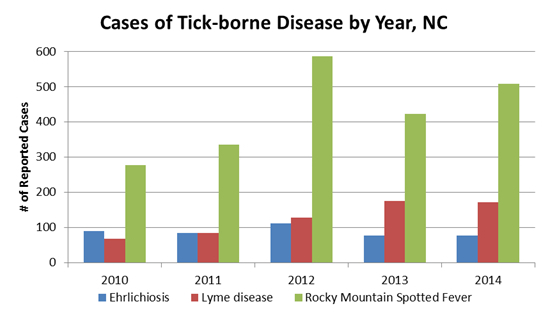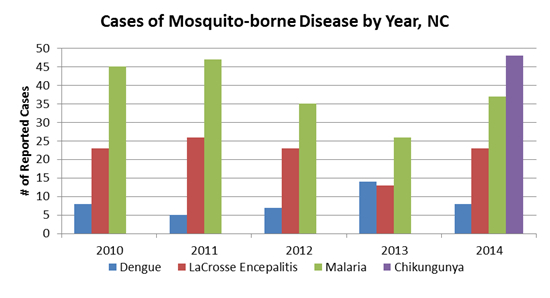Your Public Square Disclosing what is True, what is Real
April Is Tick And Mosquito Awareness Month In North Carolina
Press Release:
Raleigh, N.C. — The North Carolina Department of Health and Human Services' Division of Public Health (DPH) recommends taking precautions to protect against tick and mosquito bites as summer weather approaches.
Tick- and mosquito-borne infections are common in North Carolina, with more than 750 cases of tick-borne diseases reported in 2014 alone. Additionally, more than 100 cases of domestically acquired and travel-associated mosquito-borne diseases were reported in 2014.
"Ticks and mosquitoes are very common in our state, and they carry bacteria and viruses that can cause serious infections," said Carl Williams, State Public Health Veterinarian. "The good news is that many of these infections can be prevented by following some basic control measures."
In proclaiming April as Tick and Mosquito Awareness Month in North Carolina, Governor Pat McCrory noted that ticks and mosquitoes are a natural part of our environment and cannot be eradicated, so protective measures are the best way to avoid illnesses associated with them.
As warmer weather approaches, tick-borne diseases increase, including Rocky Mountain Spotted Fever, Lyme disease and Ehrlichiosis increase, with the majority of diagnoses occurring from June through September.
To reduce exposure to ticks:
- Avoid tick habitats, such as wooded, grassy or brushy areas.
- Use tick repellent that contains DEET (or equivalent) on exposed skin and wear permethrin-treated clothing. Use caution when applying to children.
- Reduce tick habitat on your property with selective landscaping techniques.
- If there is a tick attached to your body, carefully remove the tick by grasping it with fine-tipped tweezers as close as possible to your skin, then apply a steady, gentle pull until it releases.

Mosquito-borne diseases usually cause either no symptoms or mild, flu-like illness. However, they can cause more serious conditions, including encephalitis, meningitis and meningoencephalitis, and can be fatal. To reduce exposure to mosquitoes:
- Use mosquito repellent that contains DEET (or equivalent) when exposed to mosquitoes. Use caution when applying to children.
- Install or repair screens on windows and doors to keep mosquitoes outside and if possible, use air conditioning.
- Reduce mosquito breeding by emptying standing water from flowerpots, gutters, buckets, pool covers, pet water dishes, discarded tires and birdbaths at least once a week.

For more information on Vector-Borne Illnesses, visit: http://epi.publichealth.nc.gov/cd/diseases/vector.html
To read Governor McCrory's proclamation, visit www.governor.state.nc.us/newsroom/proclamation/20150401/tick-and-mosquito-awareness-month
NC Department of Health and Human Services
- 2001 Mail Service Center
- Raleigh, NC 27699-2001
- news@dhhs.nc.gov •(919) 855-4840
| Across North Carolina: Volume I | Healthy Lifestyles, North Carolina Health, Body & Soul, Health and Fitness | Federalist Party |
Latest Health and Fitness
|
The North Carolina Department of Health and Human Services is launching a Community Partner Engagement Plan to ensure the voices of North Carolina communities and families continue to be at the center of the department’s work.
Published: Tuesday, March 26th, 2024 @ 2:43 pm
By: Eastern NC NOW Staff
|
|
The North Carolina Department of Health and Human Services will host a live Spanish-language Cafecito and tele-town hall on Tuesday, Feb. 27, from 6 to 7 p.m., to discuss how to support and improve heart health as well as prevent and manage heart disease.
Published: Saturday, March 23rd, 2024 @ 8:56 pm
By: Eastern NC NOW Staff
|
|
Part of ongoing effort to raise awareness and combat rising congenital syphilis cases
Published: Saturday, March 23rd, 2024 @ 6:18 pm
By: Eastern NC NOW Staff
|
|
Recognition affirms ECU Health’s commitment to providing highly-reliable, human-centered care
Published: Wednesday, March 20th, 2024 @ 10:47 pm
By: Eastern NC NOW Staff
|
|
The North Carolina Department of Health and Human Services is launching a new Statewide Peer Warmline on Feb. 20, 2024. The new Peer Warmline will work in tandem with the North Carolina 988 Suicide and Crisis Lifeline by giving callers the option to speak with a Peer Support Specialist.
Published: Wednesday, March 20th, 2024 @ 1:29 am
By: Eastern NC NOW Staff
|
|
A subsidiary of one of the largest health insurance agencies in the U.S. was hit by a cyberattack earlier this week from what it believes is a foreign “nation-state” actor, crippling many pharmacies’ ability to process prescriptions across the country.
Published: Tuesday, March 5th, 2024 @ 1:12 am
By: Daily Wire
|
|
The John Locke Foundation is supporting a New Bern eye surgeon's legal fight against North Carolina's certificate-of-need restrictions on healthcare providers.
Published: Monday, March 4th, 2024 @ 11:08 am
By: Carolina Journal
|
|
The North Carolina Department of Health and Human Services today released the following statement on the Trails Carolina investigation:
Published: Sunday, March 3rd, 2024 @ 12:19 pm
By: Eastern NC NOW Staff
|
|
The North Carolina Department of Health and Human Services today released a draft of its 2024-25 Olmstead Plan designed to assist people with disabilities to reside in and experience the full benefit of inclusive communities.
Published: Sunday, March 3rd, 2024 @ 11:36 am
By: Eastern NC NOW Staff
|
|
The North Carolina Department of Health and Human Services will host a live fireside chat and tele-town hall on Tues., Feb. 20, from 6 to 7 p.m., to discuss how to support and improve heart health as well as prevent and manage heart disease.
Published: Saturday, March 2nd, 2024 @ 2:30 pm
By: Eastern NC NOW Staff
|
|
The North Carolina Department of Health and Human Services is investing $5.5 million into the FIT Wellness program, part of the North Carolina Formerly Incarcerated Transition Program in the UNC School of Medicine, to improve reentry services for the justice-involved population.
Published: Thursday, February 29th, 2024 @ 12:24 pm
By: Eastern NC NOW Staff
|
|
As of Feb. 1, 2024, 346,408 newly eligible North Carolinians are enrolled in Medicaid and now have access to comprehensive health care, according to the North Carolina Department of Health and Human Services’ Medicaid Expansion Enrollment Dashboard.
Published: Wednesday, February 28th, 2024 @ 11:22 am
By: Eastern NC NOW Staff
|
|
Controversy surrounds a healthcare provider’s decision to block parents from having access to their children’s prescription records.
Published: Wednesday, February 28th, 2024 @ 8:40 am
By: Carolina Journal
|
























